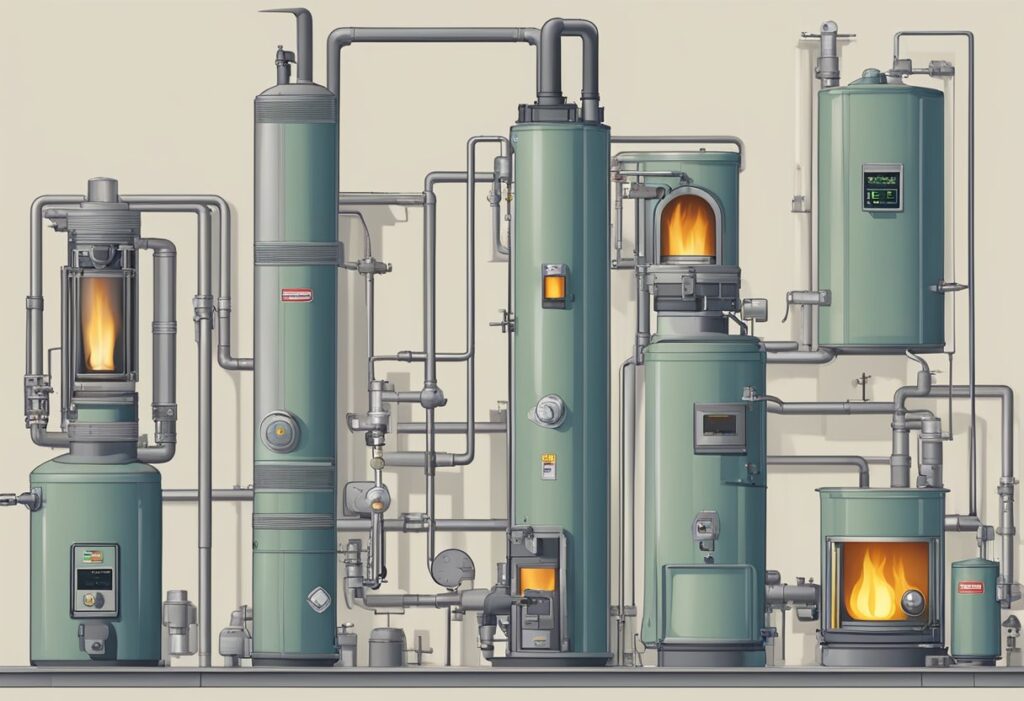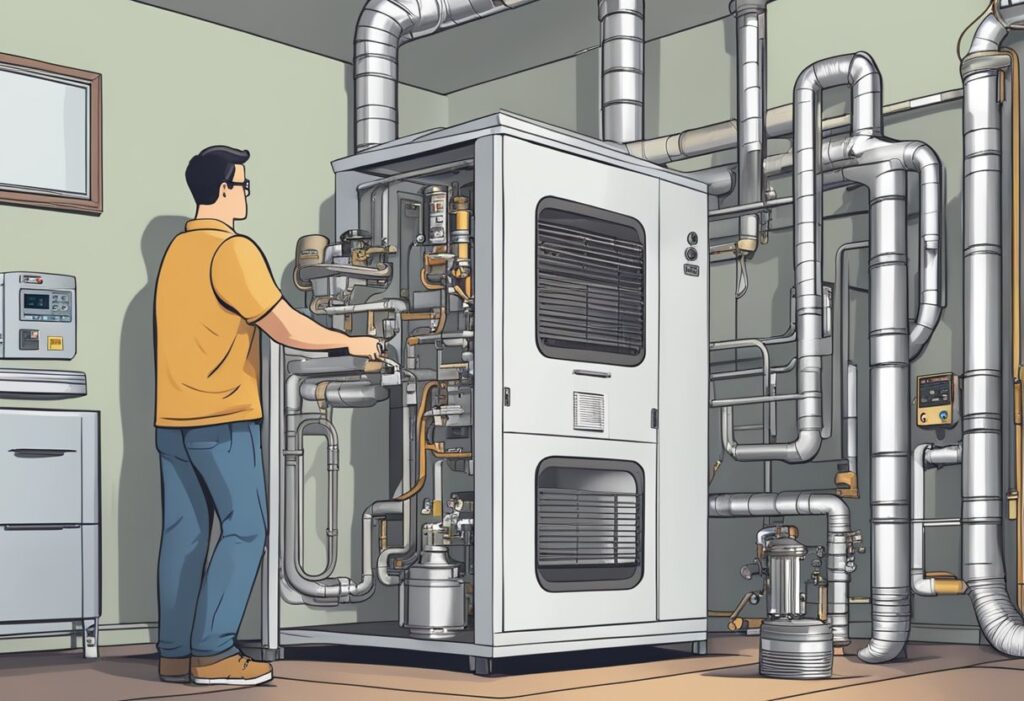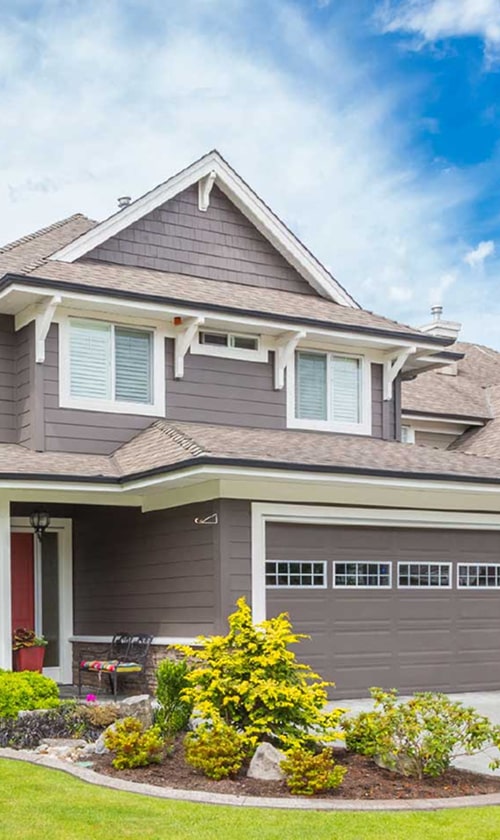Overview of Gas Furnaces
Gas furnaces are a common choice for home heating due to their ability to provide reliable and efficient warmth. These systems operate using either natural gas or propane, with natural gas being more widespread due to its availability and lower cost. The core of a gas furnace’s functionality is the combustion of gas to produce heat, which is then distributed throughout the home.
The energy efficiency of gas furnaces is measured by the Annual Fuel Utilization Efficiency (AFUE) rating, which indicates the percentage of energy converted into heat. Modern gas furnaces typically have AFUE ratings ranging from 80% to over 98%, signifying that a majority of the gas is utilized for heating. The higher the AFUE, the more cost-effective and energy-efficient the furnace.

When it comes to heating capacity, gas furnaces are rated in British Thermal Units (BTU). A higher BTU rating means the furnace can produce more heat, which is necessary for larger spaces. We ensure appropriate sizing to avoid wasted energy or inadequate heating.
Gas furnaces have evolved to offer better heat distribution and temperature control within homes. Advanced systems may include two-stage or modulating burners and variable speed fans to provide more even heat and enhanced comfort.
It is crucial for homeowners to understand that while gas furnaces are efficient and effective, they require regular maintenance to operate safely and at peak performance. Adequate ventilation and proper exhaust systems are essential to prevent the buildup of harmful combustion byproducts, such as carbon monoxide.
Advantages of Using Gas Furnaces
In considering a heating system for a home or business, we recognize that gas furnaces stand out for their cost-effectiveness and efficient heating performance. These advantages contribute to both long-term savings and enhanced indoor comfort.
Cost-Effectiveness and Energy Efficiency
Gas furnaces are known for their cost savings due to the relatively low price of natural gas compared to other fuels. When we look at the efficiency of gas furnaces, the Annual Fuel Utilization Efficiency (AFUE) rating becomes quite important. High-efficiency gas furnaces typically have an AFUE rating of 90% or higher, meaning they convert 90% or more of their fuel directly into heat. This minimizes waste and can significantly reduce monthly utility bills.
- Operating Costs: On average, the fuel costs for gas furnaces are lower when compared to electric or oil-based systems.
- Energy Efficiency Ratings: Modern gas furnaces often offer improved energy efficiency ratings, leading to less energy consumption and lower energy bills.
Heating Performance and Comfort
Gas furnaces offer superior heating performance. They are capable of producing heat as soon as the burner is ignited, resulting in rapid and effective warming of the space. The addition of a heat exchanger in modern units heightens this effect, ensuring maximum transfer of heat from the combustion process to the air in the home.
- Comfort: The heat delivered by gas furnaces tends to be warmer than that of heat pumps, providing a cozy feel during the colder months.
- Thermostat Control: With advancements in thermostat technology, maintaining the desired temperature becomes effortless, and automatic adjustments ensure consistent indoor comfort.
Tables and lists are not applicable to the provided entities.
Disadvantages of Gas Furnaces
We must acknowledge that while gas furnaces are popular for their efficiency and widespread use, they come with their own set of drawbacks. Our focus here lays on safety and maintenance as well as installation challenges and their associated costs, which every potential buyer should consider.
Safety and Maintenance Considerations
Gas furnaces require regular maintenance to operate safely and effectively. Neglecting this can lead to safety risks, including the potential for carbon monoxide poisoning. This colorless, odorless gas is a byproduct of incomplete combustion within the furnace. To prevent this, homeowners need to have functioning carbon monoxide detectors and should schedule annual inspections of the heating system to ensure that components like the flame sensor and the overall combustion appliance are working properly.
Safety Concerns
- Risk of carbon monoxide leakage
- Potential for gas leaks and fires
- Need for an operational flame sensor to detect burner issues
Maintenance Requirements
- Annual professional check-ups
- Regular filter changes
- Periodic checks of system components
Installation Challenges and Costs
The installation process of a gas furnace is not only complex but also carries a notable upfront cost. Professional expertise is mandatory for safely installing the unit, including correct handling of the gas line and ventilation system. This expertise comes at a price, increasing the overall investment.
Installation Cost
- High due to need for skilled labor
- Extra expenses if adapting from a different heating system
Installation Challenges
- Complexity of installing gas lines correctly
- Ensuring proper venting to prevent exhaust backflow
It’s evident that the reliability of gas furnaces is dependent on addressing these safety and installation factors appropriately. Regular maintenance schedules and a thorough, professional installation are fundamental in mitigating the inherent risks involved with this type of heating system.
Environmental Impact and Energy Source
As we consider the environmental impact and energy sources associated with heating systems, it’s imperative to assess how gas furnaces stack up against alternatives. The focus here is primarily on greenhouse gas emissions, dependence on fossil fuels, and the potential for energy efficiency.
Comparing Gas to Alternative Heating Systems
Gas furnaces operate by burning natural gas to generate heat, which means they rely on fossil fuels. This combustion process releases carbon dioxide and other greenhouse gases into the atmosphere, which contributes to climate change. Despite technological advancements, gas furnaces are less environmentally friendly compared to some alternatives because they are not renewable energy sources.
Electric furnaces and heat pumps represent two common alternatives to gas furnaces. Here’s a direct comparison:
- Electric Furnaces: These convert electricity directly into heat and can be more efficient in their operation. They do not emit greenhouse gases at the point of use. However, if the electricity is generated from fossil fuels, indirect emissions can be substantial.
- Heat Pumps: These are highly energy-efficient and can operate as both heating and cooling systems. They transfer heat rather than generating it through combustion. Heat pumps can be paired with renewable energy sources for an even lower environmental impact.
- Dual-Fuel Systems: Some systems combine a gas furnace with an electric heat pump to optimize efficiency. During milder temperatures, the heat pump operates, but when it gets colder, the system switches to the gas furnace. This helps reduce fossil fuel usage though it doesn’t eliminate it.
- Geothermal Heat Pumps: These are among the most energy-efficient and environmentally friendly options. They use the Earth’s stable ground temperature to heat and cool homes, resulting in significantly lower greenhouse gas emissions compared to traditional gas furnaces.
To sum up, while gas furnaces are widely used and effective for heating, we must weigh their environmental impacts. Alternatives like electric furnaces, heat pumps, and especially geothermal systems provide varying degrees of energy efficiency and environmental benefits that are worth considering in our quest for sustainable heating solutions.
Making an Informed Decision
As we consider the environmental impact and energy sources associated with heating systems, it’s imperative to assess how gas furnaces stack up against alternatives. The focus here is primarily on greenhouse gas emissions, dependence on fossil fuels, and the potential for energy efficiency.

Comparing Gas to Alternative Heating Systems
Gas furnaces operate by burning natural gas to generate heat, which means they rely on fossil fuels. This combustion process releases carbon dioxide and other greenhouse gases into the atmosphere, which contributes to climate change. Despite technological advancements, gas furnaces are less environmentally friendly compared to some alternatives because they are not renewable energy sources.
Electric furnaces and heat pumps represent two common alternatives to gas furnaces. Here’s a direct comparison:
- Electric Furnaces: These convert electricity directly into heat and can be more efficient in their operation. They do not emit greenhouse gases at the point of use. However, if the electricity is generated from fossil fuels, indirect emissions can be substantial.
- Heat Pumps: These are highly energy-efficient and can operate as both heating and cooling systems. They transfer heat rather than generating it through combustion. Heat pumps can be paired with renewable energy sources for an even lower environmental impact.
- Dual-Fuel Systems: Some systems combine a gas furnace with an electric heat pump to optimize efficiency. During milder temperatures, the heat pump operates, but when it gets colder, the system switches to the gas furnace. This helps reduce fossil fuel usage though it doesn’t eliminate it.
- Geothermal Heat Pumps: These are among the most energy-efficient and environmentally friendly options. They use the Earth’s stable ground temperature to heat and cool homes, resulting in significantly lower greenhouse gas emissions compared to traditional gas furnaces.
To sum up, while gas furnaces are widely used and effective for heating, we must weigh their environmental impacts. Alternatives like electric furnaces, heat pumps, and especially geothermal systems provide varying degrees of energy efficiency and environmental benefits that are worth considering in our quest for sustainable heating solutions.
Making an Informed Decision
When we consider the installation of a gas furnace, it’s crucial to weigh both the pros and cons. To start, we assess the fuel source—natural gas or propane—acknowledging that availability and regional fuel cost significantly impact our ongoing utility bills.
- Electricity is necessary for most gas furnaces to operate the blowers, pilot light, and electronics. During power outages, unless we have a backup generator, we might lose heating capabilities.
For optimal performance, ductwork and vents must be evaluated since improper venting can lead to a buildup of carbon monoxide, posing a health risk. We ensure proper installation of flues and venting systems, often utilizing a chimney. This protects against carbon monoxide and mitigates the possibility of fires.
- Cost to Install: Gas furnaces generally have higher upfront furnace installation costs than electric models but can be more energy efficient.
- Repairs and maintenance: Regular cleaning and inspection can extend our furnace’s lifespan and uphold its Annual Fuel Utilization Efficiency (AFUE) rating.
- Noise: Modern units are designed to operate quietly, but older models can be noisy.
Electric heat pumps serve as an alternative, offering heating and cooling without the need for combustible fuel. We consider these for their cost-effectiveness and potentially lower utility bills.
We must consult with a reputable HVAC company to discuss options that best fit our home. They provide guidance on HVAC systems, inclusive of air conditioners and furnaces, as well as the HVAC industry standards for AFUE ratings.
In colder climates, high winter temperatures necessitate reliable heating. We evaluate expense against comfort and peace of mind, especially in areas prone to severe winter conditions. We consider an electric model or a dual system that could ensure heating continuity during outages.
Our final decision hinges on thorough analysis of these factors, bearing in mind the long-term impacts on our comfort, safety, and finances.
Frequently Asked Questions
What are the most common advantages of installing a gas furnace in residential properties?
Gas furnaces offer rapid and powerful heating, which can be advantageous in colder regions. They tend to have a longer lifespan and are generally more effective in producing heat per unit of fuel consumed compared to most electric furnaces.
What are the primary considerations regarding the operation costs of gas furnaces?
The operation costs of gas furnaces are influenced by fuel prices, which can fluctuate greatly. Additionally, the efficiency rating of the unit determines how much gas is utilized, thereby affecting overall operating costs.
How do gas furnaces compare to electric furnaces in terms of energy efficiency?
Gas furnaces often have higher energy efficiency ratings compared to electric furnaces, meaning they can provide the same amount of heat using less energy. However, the efficiency of any heating system also depends on proper installation, maintenance, and the insulation of the home.
Can you list the main disadvantages homeowners might encounter with gas furnaces?
One of the primary disadvantages is the potential risk of carbon monoxide leaks, which requires installation of detectors and regular maintenance checks. Gas furnaces also require venting systems to expel combustion gases, and failure to maintain these systems can pose safety risks.
What factors should be considered when deciding between a gas furnace and a heat pump for home heating?
Considerations include the climate you live in, since heat pumps are less effective in very cold weather, and the local cost and availability of natural gas versus electricity. The initial installation cost and long-term energy savings should also be factored into this decision.
In what situations is a gas furnace considered a less favorable option than alternative heating systems?
In areas where electricity costs are significantly lower than natural gas or where gas is not readily available, an electric furnace or heat pump may be more cost-effective. If a home is not already outfitted for gas heating, the installation of necessary gas lines and venting can also be a deterrent.




